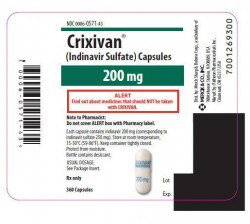Crixivan (indinavir) Coupons, Discounts & Cost
Crixivan (indinavir) is an antiviral drug with activity against human immunodeficiency virus type 1 (HIV-1). One way to save money on the Coumadin (warfarin) retail cost regardless of income and insurance status is to use Coumadin (warfarin) coupons or discount cards from RXCoupons. Use our Coumadin (warfarin) coupons at your online pharmacy and receive up to 75% off the sale price each time you refill your prescription.
What is Crixivan (indinavir)?
Crixivan (indinavir) is an antiviral drug with activity against human immunodeficiency virus type 1 (HIV-1).
Crixivan (indinavir) direct indications for use
Crixivan should be used: - In combination with other antiretroviral drugs permitted for the treatment of adult patients with HIV-1 infection.
Crixivan dosage information
The recommended dose of the drug is 800 mg (usually in the form of two capsules of 400 mg) every 8 hours. The maximum daily dose of the drug is 2.4 g
It is possible to use the drug (400 mg) in combination therapy with ritonavir (100 mg). Both drugs are taken orally twice a day, regardless of meals.
It is important to drink enough water 1 hour before or 2 hours after eating (for optimal absorption). Crixivan can be taken with other liquids such as milk, juice, coffee or tea. It is possible to eat low-fat products. It is recommended to drink at least 1.5 liters of fluid daily.
Crixivan (indinavir) contraindications
Do not use this drug in case of hypersensitivity to indinavir.
Do not use Crixivan (as monotherapy or in combination with ritonavir) with amiodarone, terfenadine, cisapride, astemizole, alprazolam, triazolam, midazolam, pimozide, ergot alkaloids, simvastatin or lovastatin.
Crixivan should not be used in combination with St. John's wort (Hypericum perforatum), or preparations containing St. John's wort.
The drug should be used with caution in patients with liver disease.
Combination therapy with Crixivan and ritonavir should not be mixed with alfuzosin, pethidine, piroxicam, encainide, flecainide, propafenone, quinidine, fusidic acid, clozapine, clorazepate dipotassium, diazepam, flurazepam, rosuvastatin.
Patients with rare hereditary lactose intolerance, lactase deficiency or glucose-galactose malabsorption should not use Crixivan (the product contains lactose).
The drug is not used in children under 4 years of age.
Use with caution in patients with urolithiasis, tubulointerstitial nephritis, renal failure, hemophilia A and B, hyperglycemia, diabetes, lipodystrophy, osteonecrosis.
Crixivan (indinavir) side effects
Digestive system: abdominal pain, heartburn, nausea, vomiting, flatulence, taste disturbance, hyperbilirubinemia. Blood: hemolytic anemia. CNS: asthenia, fatigue, dizziness, headache, hypoesthesia, insomnia. Urinary system: nephrolithiasis, hematuria, proteinuria. Dermatological reactions: itching, dry skin. Other reactions: lymphadenopathy.
Concomitant treatment with Crixivan (indinavir)
Rifabutin In case of combined therapy, it is recommended to reduce the dose of rifabutin and increase Crixivan dose to 1000 mg every 8 hours.
Ketoconazole When concomitantly used with ketoconazole, the dose of Crixivan should be reduced to 600 mg every 8 hours.
Itraconazole When concomitantly used with itraconazole (200 mg twice daily), the dose of Crixivan should be reduced to 600 mg every 8 hours.
Delavirdine Reduce the dose of Crixivan to 600 mg every 8 hours in combined therapy with delavirdine (400 mg 3 times a day).
Efavirenz When concomitantly used with efavirenz (600 mg), the dose of Crixivan should be increased to 1000 mg every 8 hours.
Patients with concomitant diseases Liver failure due to cirrhosis: patients with mild or moderate hepatic insufficiency caused by cirrhosis should reduce the dose of the drug to 600 mg every 8 hours.
Crixivan (indinavir) special instructions
During treatment with indinavir, patients should drink enough in order to avoid the development of nephrolithiasis. A dose reduction of indinavir is recommended in case of hepatic insufficiency.
The safety and efficacy of indinavir has not been studied in children.

